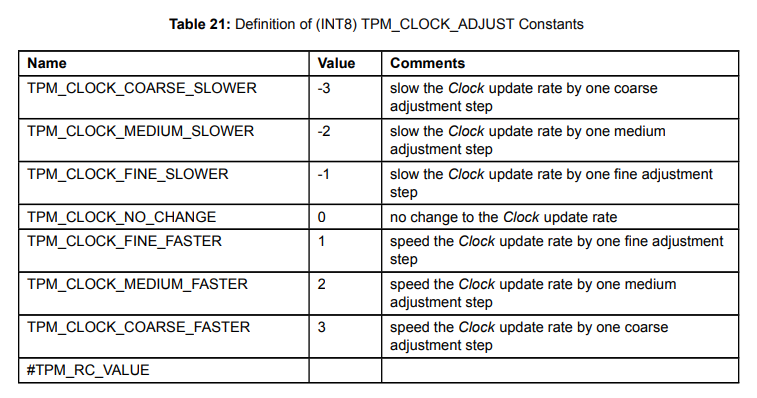Posts
4963Following
329Followers
494OpenPGP: 3AB05486C7752FE1
Jarkko Sakkinen
jarkkohttps://github.com/puavo-org/tpm2sh/blob/main/src/key/tpm_key.rs
It took me like 30 minutes after reading tutorial a bit get ongoing.
Jarkko Sakkinen
jarkkogreat now i have a single data-drive test where test cases translate between legacy (build/parse) and new (zerocopy fat pointers):
# ...
TPM_CC_Startup Response TPM_RC_FAILURE 80010000000a00000101
TPM_CC_Startup Response TPM_RC_CONTEXT_GAP 80010000000a00000901
TPM_CC_PCR_Read Response Success 800100000038000000000000000100000000000000010020dededededededededededededededededededededededededededededededed
# ...
Jarkko Sakkinen
jarkkohttps://lore.kernel.org/linux-integrity/aMboFXNNX7WZaOaS@kernel.org/
PoC: https://github.com/puavo-org/tpm2sh/commit/18ec3c2169b23523d8866c58fa7b8a89a79bd3d4
#linux #kernel #tpm
Jarkko Sakkinen
jarkkohttps://git.kernel.org/pub/scm/linux/kernel/git/jarkko/tpm2-protocol.git/commit/?id=4f48396e0df888ee6a5e8a2df92d71cfc05d26d8
After this it is downhill.
I'm doing this like an idiot, i.e. learning as I bump e.g., up until yesterday I was not even aware of Ref and Deref trait :-)
Jarkko Sakkinen
jarkkoawesome “cast” version of tpm_enum!:
tpm_enum_cast! {
name: TpmRcBaseCast,
repr: TpmUint32,
value_enum: TpmRcBaseEnumCast,
value_repr: u32,
variants: {
(Success, 0x0000, "TPM_RC_SUCCESS"),
(BadTag, 0x001E, "TPM_RC_BAD_TAG"),
(Initialize, TPM_RC_VER1, "TPM_RC_INITIALIZE"),
(Failure, TPM_RC_VER1 | 0x001, "TPM_RC_FAILURE"),
// ...
Jarkko Sakkinen
jarkkoI could implement e.g. tpm2-protocol by using that as dependency but never could reach optimal results for the underlying data.
Jarkko Sakkinen
jarkkoCast version TPM structures starts to shape:
use crate::{tpm_struct_cast, TpmUint32, TpmUint64, TpmUint8};
tpm_struct_cast! {
name: TpmsClockInfoCast,
field_enum: TpmsClockInfoField,
field_ref_enum: TpmsClockInfoFieldRef,
fields: {
(pub clock: TpmUint64<'a>),
(pub reset_count: TpmUint32<'a>),
(pub restart_count: TpmUint32<'a>),
(pub safe: TpmUint8<'a>),
}
}
And after migration is completed:
use crate::{tpm_struct_cast, TpmUint32, TpmUint64, TpmUint8};
tpm_struct! {
name: TpmsClockInfo,
field_enum: TpmsClockInfoField,
field_ref_enum: TpmsClockInfoFieldRef,
fields: {
(pub clock: TpmUint64<'a>),
(pub reset_count: TpmUint32<'a>),
(pub restart_count: TpmUint32<'a>),
(pub safe: TpmUint8<'a>),
}
}
Jarkko Sakkinen
jarkkoJarkko Sakkinen
jarkkohttps://git.kernel.org/pub/scm/linux/kernel/git/jarkko/tpm2-protocol.git/commit/?id=a0f2b3b7f70f6d1151a85c1fadaac5f181e09d91
I'm just learning Rust while doing, really discovered Deref and DerefMut while doing this transformation.
Jarkko Sakkinen
jarkko1. Ext4
2. FAT (and its various upgrades)
There's no operating system that could not read them I'm aware of.
Within last 20 years I've never had a situation where I'm in trouble because my machine does not have "advanced filesystem" :-) And basing backup strategy to local snapshots, well good luck with that. I have NAS.
Jarkko Sakkinen
jarkkoJarkko Sakkinen
jarkkono SIZE constant anymore in the new TpmSized as no stack allocation is required:
/// Provides a `dyn`-safe way to get the exact size of a zero-copy cast object.
pub trait TpmSizedCast {
/// Returns the exact serialized size of the object.
fn len(&self) -> usize;
/// Returns `true` if the object has a serialized length of zero.
fn is_empty(&self) -> bool {
self.len() == 0
}
}
This ought to be renamed as TpmSized as full migration is over :-) Applies also to all other *Cast.
Jarkko Sakkinen
jarkkohttps://git.kernel.org/pub/scm/linux/kernel/git/jarkko/tpm2-protocol.git/commit/?id=28664f46cdcf2c5527d0c3e409a292dad2501bba
now it will be downhill :-)
#linux #rust #tpm
Jarkko Sakkinen
jarkkoJarkko Sakkinen
jarkkoJarkko Sakkinen
jarkkohttps://git.kernel.org/pub/scm/linux/kernel/git/jarkko/tpm2-protocol.git/tree/src/list.rs
Jarkko Sakkinen
jarkkoIn the end of the day this is superior despite adding up a new trick to my sack of random macro hacks:
tpm_integer!(u8, TpmUint8, Unsigned);
tpm_integer!(i8, TpmInt8, Signed);
tpm_integer!(u16, TpmUint16, Unsigned);
tpm_integer!(i32, TpmInt32, Signed);
tpm_integer!(u32, TpmUint32, Unsigned);
tpm_integer!(u64, TpmUint64, Unsigned);
Now the names match TCG specification names, and they are also first fully zerocopy migrated types. This way previously redundant looking field now is actually self-documenting field.
Other zerocopy types will get the nasty “Cast” postfix up until migration is complete (e.g., TpmBufferCast).
For the record, the last field is used to address exactly one quirk related to TCG specs: TPM_CLOCK_TIME, meaning that “invalid discriminant error” needs too versions :-/
I’m sure we would get numbers going from zero to six, and “get this complex science” as e.g., most of have ability to read, and understand nuances such as the difference between slower and faster… This is DailyWTF proximity enough level bad definition that I tend to like that TPM_CLOCK_TIME exist…
Jarkko Sakkinen
jarkkoGreat now I think I have solid base traits in place i.e., TpmCast, TpmCastMut, TpmHasCast and TpmHasCastMut:
I also relaxed the contribution guidelines just a little bit:
//! * `alloc` is disallowed.
//! * Dependencies are disallowed.
//! * Developer dependencies are disallowed.
-//! * Panics are disallowed.
+//! * Panics are allowed disallowed by default, except concrete type casts in
+//! `TpmCast::as_slice` is allowed to use `unwrap` as long as
+//! `TpmCast::from_slice` meets the documented contract.
Jarkko Sakkinen
jarkkoWhat would be a simple stochastis model that I could apply to my serial link emulator to add "realistic line noise", and don't have climb mountains to implement the algorithm?
Jarkko Sakkinen
jarkkoModern IDEs feel like ransomware. They completely destroy the screen when there's like one punctation mark missing or something and only thing that auto-complete accomplishes for me is the lost focus on task.
I tried in Sublime Text with Copilot only because Microsoft provides me a free pro license for it and it was even worse than normal autocomplete given it's wrong and fallible suggestions that completely destroy focus. I just wanted to see what it is like and it was piece of shit tbh.
Rust macros are actually a bit like "autocomplete all my objects with traits" type of tool where you write a recipe on how to auto-complete.
